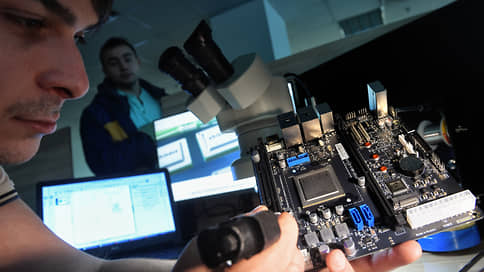Mintsifry wants to tighten the conditions for the inclusion of Russian software in the registry
[ad_1]

The Ministry of Digital Development wants to tighten the conditions for including Russian software in the register. We are talking about the fact that domestic software is compatible with at least two Russian operating systems (OS) and processors included in the register of the Ministry of Industry and Trade. Opinions of market participants concerning software were divided. Some support the idea, while others talk about rising developer costs and problems for consumers who will continue to use Windows. But everyone agrees that the requirement for processors is premature.
“Kommersant” got acquainted with the draft amendments that the Ministry of Digital Transformation intends to make to the resolutions governing the procedure for including Russian software in the register of domestic software – these are resolutions No. 1236 and No. 325. It follows from the document that the ministry wants to oblige software developers to adapt software that expects to be included in the register to work with at least one Russian processor entered in the corresponding register of the Ministry of Industry and Trade, as well as two domestic operating systems.
The document has been sent for discussion to specialized companies, Kommersant sources say. One of them said that he knew that the document was discussed with companies in July.
The Ministry of Digital Transformation told Kommersant that they expect to approve the new rules this year. But they will come into force “in stages starting from 2024.”
“Compatibility with a domestic processor will not be mandatory for inclusion in the registry, but will allow you to meet additional requirements that are important for potential customers,” the ministry said.
The development of software and its adaptation to work with the OS take a long time, in connection with which the Ministry of Digital Transformation “already has taken care of the introduction of such requirements, this is fully consistent with the strategy for the development of microelectronics in Russia,” the Ministry of Industry and Trade added.
Maksut Shadayev, head of the Ministry of Digital Development, TASS, in November 2022:
“We are waiting for proposals from the industry to “land” Russian software in Russian hardware.”
Adapting software to work with a specific processor architecture or OS can require significant effort and resources, says Only CEO Kirill Vladimirov.
“If the requirements become too strict or resource-intensive for developers, some of them may decide not to add their software to the registry or even exclude it,” Mr. Vladimirov says.
“In exchange for an additional load, developers get access to public procurement and tax preferences,” objected Nikolai Komlev, head of the council of the Russian Chamber of Commerce and Industry for the development of the digital economy. At the same time, Mr. Komlev clarifies, changes in the rules may lead some companies working with the public sector to completely reorient themselves to support Linux, refusing to release new versions of their software for Windows.
According to the Russoft Association, the share of Russian companies that develop applications for Windows has already dropped to a record low of 68%. In 2020-2022, the indicator was at the level of 74-79%, and before that it was 94-97%. The shares of Android, iOS and Mac OS in the total volume of use of operating systems at the end of 2022 decreased by 1.5–2 times.
The popularity of the Linux family OS, specify in Russoft, is growing: in 2022 alone, the amount of working time spent by developers on projects based on it has grown from 49% a year earlier to 61%.
Red Soft believes that by January 1, 2025, Windows may lose the bulk of the Russian corporate market. Such forecast, explain in Red Soft, is connected with requirements of the government which oblige state companies to provide substitution on classes of software for which there are already Russian analogs, and first of all it will concern operating systems and office packages.
In the context of sanctions and voluntary restrictions, which were joined by Microsoft, Apple, Intel and other Western vendors, “it is objectively strange to encourage our developers with benefits for developing exclusively for foreign platforms,” says Pavel Kalyakin, CEO of MyOffice.
But experts emphasize that in order to develop solutions on free code, which includes Linux, open libraries and participation in the specialized IT community are needed.
Dmitry Ovchinnikov, chief specialist of the department of complex information security systems at Gazinformservice, says that after the Russian Federation was disconnected from the freely distributed library code (GitHub), programmers are forced to fix the identified errors themselves and develop the software only on their own. The Ministry of Digital Development, which is responsible for creating an independent “analogue of GitHub”, assured that they are working on the project “together with the profile communities.”
At the same time, in assessing the mandatory compatibility with Russian processors, experts and market participants are generally unanimous. But this does not make practical sense, Russian chips are not produced due to sanctions, “perhaps this requirement is introduced as a reserve for the future, when Russian developers manage to agree to print chips in China or Taiwan,” explains Mr. Komlev.
[ad_2]
Source link





